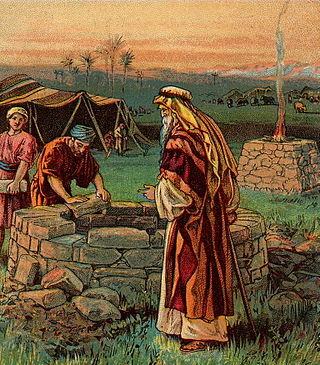
Isaac is one of the three patriarchs of the Israelites and an important figure in the Abrahamic religions, including Judaism, Christianity, and Islam. He was the son of Abraham and Sarah, the father of Jacob and Esau, and the grandfather of the twelve tribes of Israel.

Jacob, later given the name Israel, is regarded as a patriarch of the Israelites and is an important figure in Abrahamic religions, such as Judaism, Christianity, and Islam. Jacob first appears in the Book of Genesis, where he is described as the son of Isaac and Rebecca, and the grandson of Abraham, Sarah, and Bethuel. According to the biblical account, he was the second-born of Isaac's children, the elder being Jacob's fraternal twin brother, Esau. Jacob is said to have bought Esau's birthright and, with his mother's help, deceived his aging father to bless him instead of Esau. Later in the narrative, following a severe drought in his homeland of Canaan, Jacob and his descendants, with the help of his son Joseph, moved to Egypt where Jacob died at the age of 147. He is supposed to have been buried in the Cave of Machpelah.

Eli was, according to the Book of Samuel, a high priest and a judge of the Israelites in the city of Shiloh, ancient Israel. When Hannah came to Shiloh to pray for a son, Eli initially accused her of drunkenness, but when she protested her innocence, Eli wished her well. Hannah's eventual child, Samuel, was raised by Eli in the tabernacle. When Eli failed to rein in the abusive behavior of his own sons, God promised to punish his family, which resulted in the death of Eli and his sons. Later biblical passages mention the fortunes of several of Eli's descendants, and he figures prominently in Samaritan religious tradition.

Lech-Lecha, Lekh-Lekha, or Lech-L'cha is the third weekly Torah portion in the annual Jewish cycle of Torah reading. It constitutes Genesis 12:1–17:27. The parashah tells the stories of God's calling of Abram, Abram's passing off his wife Sarai as his sister, Abram's dividing the land with his nephew Lot, the war between the four kings and the five, the covenant between the pieces, Sarai's tensions with her maid Hagar and Hagar's son Ishmael, and the covenant of circumcision.
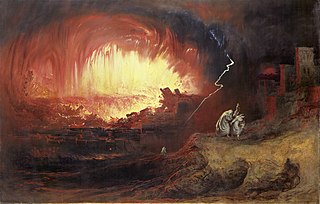
Vayeira, Vayera, or Va-yera is the fourth weekly Torah portion in the annual Jewish cycle of Torah reading. It constitutes Genesis 18:1–22:24. The parashah tells the stories of Abraham's three visitors, Abraham's bargaining with God over Sodom and Gomorrah, Lot's two visitors, Lot's bargaining with the Sodomites, Lot's flight, the destruction of Sodom and Gomorrah, how Lot's daughters became pregnant by their father, how Abraham once again passed off his wife Sarah as his sister, the birth of Isaac, the expulsion of Hagar, disputes over wells, and the binding of Isaac.

Chayei Sarah, Chaye Sarah, Hayye Sarah, or Hayyei Sara, is the fifth weekly Torah portion in the annual Jewish cycle of Torah reading. It constitutes Genesis 23:1–25:18. The parashah tells the stories of Abraham's negotiations to purchase a burial place for his wife Sarah and his servant's mission to find a wife for Abraham's son Isaac.

Toledot, Toldot, Toldos, or Toldoth is the sixth weekly Torah portion in the annual Jewish cycle of Torah reading. The parashah tells of the conflict between Jacob and Esau, Isaac's passing off his wife Rebekah as his sister, and Isaac's blessing of his sons.

Vayetze, Vayeitzei, or Vayetzei is the seventh weekly Torah portion in the annual Jewish cycle of Torah reading. It constitutes Genesis 28:10–32:3. The parashah tells of Jacob's travels to, life in, and return from Harran. The parashah recounts Jacob's dream of a ladder to heaven, Jacob's meeting of Rachel at the well, Jacob's time working for Laban and living with Rachel and Leah, the birth of Jacob's children, and the departure of Jacob's family from Laban.

Vayishlach or Vayishlah is the eighth weekly Torah portion in the annual Jewish cycle of Torah reading. In the parashah, Jacob reconciles with Esau after wrestling with a "man." The prince Shechem rapes Dinah, whose brothers sack the city of Shechem in revenge. In the family's subsequent flight, Rachel gives birth to Benjamin and dies in childbirth.
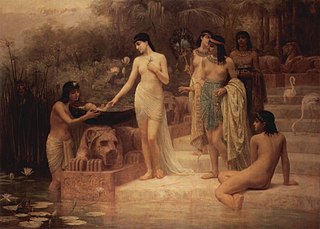
Shemot, Shemoth, or Shemos is the thirteenth weekly Torah portion in the annual Jewish cycle of Torah reading and the first in the Book of Exodus. It constitutes Exodus 1:1–6:1. The parashah tells of the Israelites' affliction in Egypt, the hiding and rescuing of the infant Moses, Moses in Midian, the calling of Moses, circumcision on the way, meeting the elders, and Moses before Pharaoh.
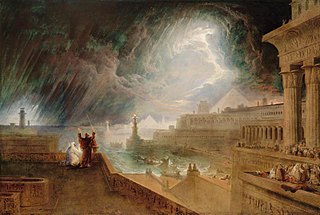
Va'eira, Va'era, or Vaera is the fourteenth weekly Torah portion in the annual Jewish cycle of Torah reading and the second in the Book of Exodus. It constitutes Exodus 6:2–9:35. The parashah tells of the first seven Plagues of Egypt.

Ki Tisa, Ki Tissa, Ki Thissa, or Ki Sisa is the 21st weekly Torah portion in the annual Jewish cycle of Torah reading and the ninth in the Book of Exodus. The parashah tells of building the Tabernacle, the incident of the Golden calf, the request of Moses for God to reveal God's Attributes, and how Moses became radiant.

Pekudei, Pekude, Pekudey, P'kude, or P'qude is the 23rd weekly Torah portion in the annual Jewish cycle of Torah reading. It is the 11th and last in the Book of Exodus. The parashah tells of the setting up of the Tabernacle.

Behaalotecha, Beha'alotecha, Beha'alothekha, or Behaaloscha is the 36th weekly Torah portion in the annual Jewish cycle of Torah reading and the third in the Book of Numbers. The parashah tells of the Menorah in the Tabernacle, the consecration of the Levites, the Second Passover, how pillars of cloud and fire led the Israelites, the silver trumpets, how the Israelites set out on their journeys, the complaints of the Israelites, and how Miriam and Aaron questioned Moses. The parashah comprises Numbers 8:1–12:16. It is made up of 7,055 Hebrew letters, 1,840 Hebrew words, 136 verses, and 240 lines in a Torah Scroll.

Devarim is the 44th weekly Torah portion in the annual Jewish cycle of Torah reading and the first in the Book of Deuteronomy. It comprises Deuteronomy 1:1–3:22. The parashah recounts how Moses appointed chiefs, the episode of the Twelve Spies, encounters with the Edomites and Ammonites, the conquest of Sihon and Og, and the assignment of land for the tribes of Reuben, Gad, and Manasseh.

Nitzavim, Nitsavim, Nitzabim, Netzavim, Nisavim, or Nesabim is the 51st weekly Torah portion in the annual Jewish cycle of Torah reading and the eighth in the Book of Deuteronomy. It comprises Deuteronomy 29:9–30:20. In the parashah, Moses told the Israelites that all the people stood before God to enter into the covenant, violation of which would bring on curses, but if they returned to God and heeded God's commandments, then God would take them back in love and bring them together again from the ends of the world. Moses taught that this Instruction was not beyond reach, and Moses put before the Israelites life and death, blessing and curse, and exhorted them to choose life by loving God and heeding the commandments.
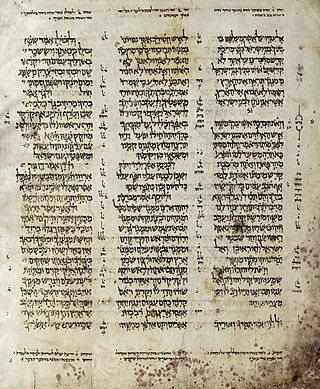
V'Zot HaBerachah, VeZos HaBerachah, VeZot Haberakha, V'Zeis Habrocho, V'Zaus Haberocho, V'Zois Haberuchu, Wazoth Habborocho, or Zos Habrocho is the 54th and final weekly Torah portion in the annual Jewish cycle of Torah reading and the 11th and last in the Book of Deuteronomy. It constitutes Deuteronomy 33:1–34:12. The parashah sets out the farewell Blessing of Moses for the 12 Tribes of Israel and concludes with the death of Moses.

Rebecca appears in the Hebrew Bible as the wife of Isaac and the mother of Jacob and Esau. According to biblical tradition, Rebecca's father was Bethuel the Aramean from Paddan Aram, also called Aram-Naharaim. Rebecca's brother was Laban the Aramean, and she was the granddaughter of Milcah and Nahor, the brother of Abraham. Rebecca and Isaac were one of the four couples that some believe are buried in the Cave of the Patriarchs, the other three being Adam and Eve, Abraham and Sarah, and Jacob and Leah.
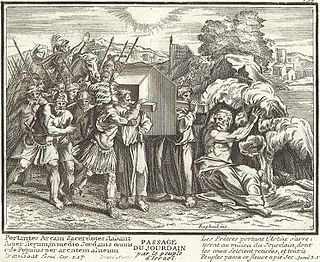
Yom HaAliyah, or Aliyah Day, is an Israeli national holiday celebrated annually according to the Jewish calendar on the tenth of the Hebrew month of Nisan to commemorate the Jewish people entering the Land of Israel as written in the Hebrew Bible, which happened on the tenth of the Hebrew month of Nisan. The holiday was also established to acknowledge Aliyah, immigration of Jews to the Jewish state, as a core value of the State of Israel, and honor the ongoing contributions of Olim, Jewish immigrants, to Israeli society. Yom HaAliyah is also observed in Israeli schools on the seventh of the Hebrew month of Cheshvan.





















